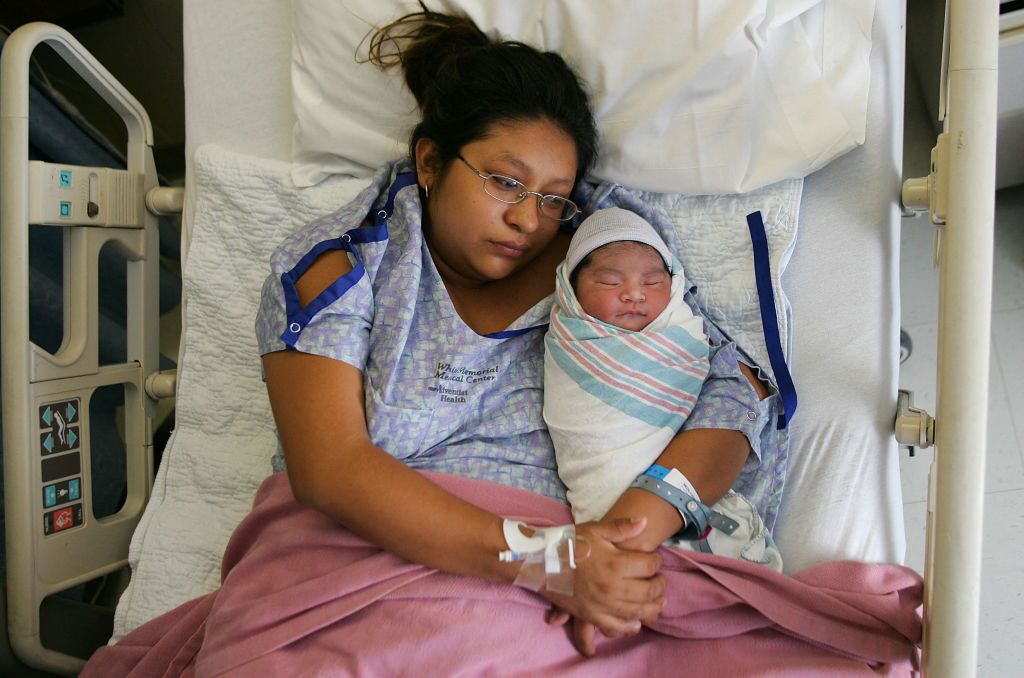With tariffs and inflation rising, moms are likely to bear the worst of the economic burden.
Stephanie lives in Kentucky with her husband and three—soon to be four—kids. While grocery shopping has always been part of her weekly responsibilities, lately it’s become an exercise in carefully considered compromises, with no room for error. What used to feed her family for the week now covers just a few days because of sharp cost increases in things like eggs and produce. (She’s not alone—the latest inflation figures show prices rose in July at their fastest pace in five months.)
Coupled with her husband’s precarious employment—he works in manufacturing and has seen colleagues laid off due to rising prices of steel and aluminum—along with Stephanie’s fear that recent legislative changes may cost her family their health insurance, it’s no wonder she’s among the average Americans fed up and desperate for change.
Any media you consume today will be dominated by think pieces and reporting on tariffs, the labor market and economic growth or decline. Lawmakers and pundits alike will let you know how our country’s economic policies are affecting the nation broadly—but they often neglect to report how these policies are affecting real people’s ability to keep a roof over their head or put food on the table for their families each night.
For Stephanie and millions of other people across the country, these legislative decisions are not just an abstract connection to GDP—they’re a very real daily crisis of affordability, which is why this conversation must shift away from sterile metaphors toward the lived experience of the families bearing the brunt of these realities.
This gap between macroeconomic policy and everyday survival is precisely why direct cash assistance programs for pregnant people and new parents—such as monthly maternal and infant cash supplements now piloted in multiple states—are crucial. These programs help families manage rising costs and financial stress, directly addressing affordability in a moment when every penny counts.
How Inflation and Tariffs Affect Women and Families Disproportionately
Tariffs are often sold to the public as a tool to ‘protect American industries’ and ‘keep American jobs.’ While that sounds good in theory, they also function as hidden taxes that can be blamed on business leaders instead of the folks imposing them. When U.S. companies face higher costs for importing goods, those costs get passed directly to consumers, which means everyday goods—from diapers to carrots—become more expensive. For low-income households, who have a limited and finite number of dollars to spend on basic needs, this increase in cost adds up quickly with significant impact.

Women, in particular, shoulder the brunt of these increased costs. We still earn less than men for the same jobs and are more likely to take on uncompensated caregiving responsibilities. Add in the relentless rise in prices and the recent rollbacks of programs like SNAP and Medicaid, and you have a perfect storm: more expenses with fewer resources and less opportunity for families to thrive. For those already navigating medical bills, childcare and housing instability, these economic headwinds can tip a family from survival to crisis in a matter of days.
To put it plainly, policies that raise prices while cutting social supports concentrate harmful impacts on those least able to absorb them: pregnant people, single mothers and low-wage workers, who are overwhelmingly women and people of color. Wage gaps, caregiving responsibilities and the responsibility of typically doing the household purchasing mean women shoulder an outsized share of these regressive burdens.
When U.S. companies face higher costs for importing goods, those costs get passed directly to consumers, which means everyday goods—from diapers to carrots—become more expensive.
A Proven Lifeline: Unconditional Cash
As a solution to the unrelenting economic burdens faced by families—and the increase in family spending during the developmentally critical time of pregnancy—unconditional cash programs beginning in pregnancy and continuing through an infant’s first years of life have sprung up across the country. From Oakland to Philadelphia and Milwaukee to Atlanta, direct cash transfer programs for moms and babies are gaining real traction as a life-saving intervention to offset the increased costs and reduced social supports families are forced to navigate on the ground.
The results speak for themselves: Participants have reported lower stress, higher birthweights and more stable housing. Babies born to participating mothers were more likely to be full-term and healthy. These aren’t just statistics—they’re proof that when you ease financial burdens on families, they are given the freedom to thrive. Together, these programs have launched the Mother and Infant Cash Coalition which is focused on scaling and sustaining these programs in the hopes of reaching every eligible pregnant person across the nation.
Immigration and the Negative Consequences of Economic Exclusion
Meanwhile, the ripple effects of workplace ICE raids and aggressive immigration enforcement within places like grocery stores and the restaurant industry are harming not only the families they’re targeting, but all of us who live in these communities and care for our neighbors. For undocumented moms, the fear of their family being torn apart keeps them and their families indoors, away from schools, friends, healthcare and the community they know and contribute to.
For moms who are pregnant, the additional stress of risking exposure in order to access prenatal care often results in forgoing medical care entirely during this vulnerable period for both mom and baby. By excluding these families from social safety nets, we’re deepening economic insecurity in already marginalized communities and keeping families from accessing the essential services we all require to live our lives fully.
A Call to Ground Policy in Real People’s Lives
Let this be the moment we stop reducing economic policy to markets and start remembering that markets are made up of people. Markets are women, they’re families, they’re people. Inflation, tariffs and immigration enforcement may be debated in separate silos in Washington or online, but for families, they converge into one lived experience of fear and tough choices with detrimental impacts. Expanding unconditional cash programs like those that make up MICC isn’t just compassionate policy—it’s smart economic strategy.
If we want a stronger, more resilient nation, we must start by investing in the people who are quite literally bringing the next generation into the world and ensuring that they have access to the goods and services they need to set that generation up to live their best and healthiest lives. Because when we make sure moms and babies have what they need to thrive, we’re not just addressing today’s crises—we’re building tomorrow’s prosperity.
A note from Ms. editors: Front & Center is a groundbreaking series amplifying the voices of Black women navigating poverty—highlighting their struggles, resilience and dreams as they care for their families, build careers and challenge systems not built for their success. Most of the writers are recipients of guaranteed income for one year. Now in its fourth year, Front & Center is a collaboration between Ms. and Springboard to Opportunities.

Great Job Tegan Lecheler & the Team @ Ms. Magazine Source link for sharing this story.




